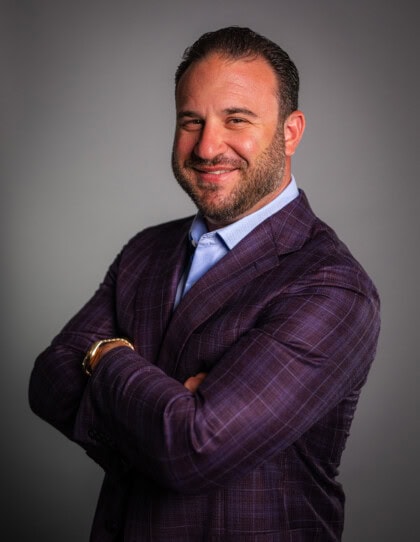When police want to question you, it's natural to feel anxious and unsure of what to do. Many people worry that asking for an attorney makes them look guilty, but this common fear is a significant misconception. Asserting your constitutional right to legal counsel is a wise decision that protects your interests.
Understanding your rights empowers you to navigate police interactions with confidence, ensuring you don't inadvertently jeopardize your future. Requesting a lawyer is a fundamental safeguard in the legal process, not an admission of wrongdoing. Keep reading to learn more about why asking for an attorney is always in your best interest.

Understanding Your Constitutional Right to Counsel
When facing legal questioning in Florida, knowing your constitutional rights is your first line of defense. These fundamental protections ensure a fair process and guard against potential overreach by law enforcement. The right to counsel provides a safeguard, allowing individuals to navigate complex legal interactions with expert guidance from a criminal defense attorney.
This right didn't emerge overnight; it developed over centuries to protect individuals from self-incrimination and ensure justice. Asserting your right to an attorney isn't a sign of guilt. Rather, it shows an understanding of how the legal system works. It establishes a necessary barrier between you and interrogators who may seek information that could be used against you.
The Fifth Amendment and the Right Against Self-Incrimination
The Fifth Amendment to the United States Constitution offers a crucial protection, the right against compelled self-incrimination. This means you can't be forced to testify against yourself in a criminal case. Invoking this right is commonly known as "pleading the Fifth."
This constitutional guarantee is deeply connected to your right to legal counsel. When you request a lawyer, you're effectively preventing yourself from inadvertently providing information that could be used by law enforcement. A lawyer ensures that your words aren't misinterpreted or used in ways you didn't intend, safeguarding your future. It's important to note that successfully asserting Fifth Amendment arguments in court can be challenging. Over a fifteen-year period, courts favored these arguments in only 22% of presented cases, underscoring the need for expert legal representation.
The Sixth Amendment and the Right to an Attorney
Distinct from the Fifth Amendment, the Sixth Amendment guarantees the right to an attorney, particularly in criminal proceedings. This right comes into play at crucial stages of the justice process, ensuring that individuals have proper legal representation. It's a cornerstone of a fair trial, guaranteeing that defendants aren't left to navigate the complex legal system alone.
While the Fifth Amendment primarily protects against self-incrimination during police questioning, the Sixth Amendment kicks in once formal charges are brought or judicial proceedings begin. Both amendments underscore the profound importance of legal counsel. They highlight how having an attorney is a protective measure throughout the entire legal journey, whether it's for DUI defense or more serious felony charges.
Miranda Warnings: What They Mean and When They Apply
The landmark Supreme Court case, Miranda v. Arizona, established the requirement for police to issue "Miranda warnings" before custodial interrogation. These warnings inform a suspect of their fundamental rights. Police must read these warnings when they take someone into custody and intend to question them.
The warnings state you have the right to remain silent, that anything you say can and will be used against you in court, and you have the right to an attorney. If you can't afford one, an attorney will be provided for you. Understanding these warnings is important because police questioning aims to gather information, which might not always benefit you.
It's common for suspects to waive these rights, often without fully understanding the implications. Waiving these rights can lead to unintentional self-incrimination, strengthen the prosecution's case, and potentially result in harsher penalties.
Why People Fear Requesting a Lawyer
Despite these clear constitutional protections, many people hesitate to ask for a lawyer when questioned by police. This reluctance often stems from deep-seated fears and common misconceptions. The pressure of a police interaction can be immense, leading individuals to make choices they later regret.
These pervasive myths can overshadow good judgment and even lead innocent people to act against their best interests. Understanding these psychological and social factors helps to explain why so many people avoid invoking their fundamental rights. It highlights the challenge individuals face when confronted by law enforcement in places like Fort Lauderdale.
Social Stigma and Misconceptions
A prevalent societal belief, often amplified by popular culture, suggests that only guilty individuals need a lawyer. This misconception can create a powerful social stigma. People fear that requesting legal counsel will instantly make them appear culpable in the eyes of law enforcement.
This fear can lead innocent individuals to hesitate, worrying that asserting their rights will make them look suspicious. Many don't realize that their right to silence is explicitly safeguarded by the Constitution. About 20% of the public even mistakenly believes that remaining silent could be used against them in court. This misunderstanding prevents people from protecting themselves.
Police Tactics and Perceived Coercion
Some police questioning tactics, while not illegal, can make individuals feel pressured or intimidated. Officers might frame a request for a lawyer as an admission of guilt. They might also imply that cooperation without an attorney will lead to leniency or a quicker resolution. It's important to remember that police officers aren't required to be truthful when interrogating suspects.
These tactics can create a difficult and confusing situation for anyone being questioned. The environment of an interrogation room is designed to be unsettling, and a person's vulnerability can be exploited. This psychological pressure often leads people to speak without a lawyer, hoping to clear their name, but often doing the opposite. For instance, 57% of the public is unaware that police can accuse them of crimes that never occurred, and 48% don't realize police can provide false information about eyewitness identifications.
Lack of Awareness Regarding Rights
A significant factor contributing to people's hesitation is a simple lack of awareness about their full constitutional rights. Many individuals simply don't know how to properly assert these rights when confronted by law enforcement. This lack of essential legal knowledge leaves them vulnerable.
Even though most people can recall basic components of Miranda warnings, only about 3% of Americans fully understand their continuing legal rights under these warnings. While 87% remember the right to silence and 80% recall the right to counsel, less than 1% understand the ongoing nature of these protections. This widespread misunderstanding leaves many unprepared for police questioning in Florida.
What Truly Happens When You Ask for a Lawyer
Demystifying the process of requesting an attorney can empower individuals to confidently invoke their rights. When you ask for a lawyer, it isn't a secret or shameful act. It's a standard, legally protected action with clear and predictable outcomes designed to protect you.
Understanding these immediate and subsequent actions can remove much of the anxiety associated with asserting your right to counsel. It shows that the legal system has specific rules in place to handle such requests. This knowledge reinforces that you're exercising a fundamental right, not causing trouble.
Police Must Cease Questioning
Once an individual clearly and unequivocally requests an attorney, law enforcement officers are legally required to immediately stop all interrogation. This is a crucial rule designed to protect your Fifth Amendment rights. Any statements made after an explicit request for counsel, but before a lawyer is present, may be inadmissible in court.
This rule means that police can't continue to ask questions or try to persuade you to talk without your lawyer. If police continue questioning after you've invoked your right to counsel, any evidence they obtain could be suppressed. This suppression means it can't be used against you in court, highlighting the power of your request.
The Role of Your Attorney
Once you contact an attorney, their role immediately becomes active and ongoing. Your lawyer advises you on your rights, explaining the legal situation in clear terms. They communicate directly with law enforcement on your behalf, acting as your official point of contact. For instance, a DUI defense attorney in Fort Lauderdale will handle all police interactions regarding your case.
An attorney reviews any potential evidence, ensures all legal procedures are followed correctly, and protects you from improper questioning. They act as a shield, standing between you and the authorities, advocating for your best interests. Having a lawyer means you're not facing the system alone, especially in Florida's complex legal landscape.
No Negative Inference in Court
It's absolutely important to understand that the act of requesting a lawyer can't legally be used as evidence of guilt in a court of law. This is a fundamental protection of your constitutional rights. Judges and juries are specifically instructed not to draw any negative inferences from an individual exercising this right.
Invoking your right to counsel is a protected action, not an admission of wrongdoing. Prosecutors aren't permitted to suggest that your request for a lawyer indicates culpability. This legal principle reinforces that asserting your rights is a wise and legally sound decision.
What if You've Already Spoken to Police?
Even if you've already had conversations with law enforcement or made statements without an attorney present, it's not too late to seek legal counsel. An experienced criminal defense attorney can still work to mitigate any potential damage caused by early statements.
They can review the circumstances of your interaction, assess the admissibility of any statements made, and develop strategies to challenge their use in court. Contacting a lawyer immediately, even after initial questioning, remains a crucial step in protecting your rights and building a strong defense.
The Undeniable Advantages of Legal Representation
Having an attorney present during police questioning or any legal interaction provides a multitude of benefits. A lawyer actively works to protect your rights, offering strategic advantages from the moment you request their presence. This professional support is invaluable in Florida's complex legal landscape.
Legal representation ensures that you aren't outmatched by the system, which can often seem overwhelming and intimidating. Your attorney becomes your advocate, guide, and protector. They're there to look out for your best interests every step of the way, whether you're facing drug offenses or gun charges.
Protecting Your Rights and Preventing Self-Incrimination
An attorney ensures that all your constitutional rights are upheld, especially your Fifth Amendment right against self-incrimination. They prevent you from making damaging statements, whether intentional or inadvertent, during questioning. A lawyer can advise you on precisely what information, if any, should be shared with law enforcement.
This protection is especially significant because speaking without counsel can lead to serious consequences. When confessions are obtained, whether they're false or accurate, jury conviction rates often range from 73% to 81%. This statistic underscores the risk of speaking to police without legal guidance, as false confessions are a known factor in wrongful convictions, particularly for vulnerable populations.
Studies show that juveniles are two to three times more likely to falsely confess than adults. This makes legal counsel even more critical for minors facing police questioning. An experienced juvenile crimes lawyer can offer tailored protection for young individuals navigating the legal system.
Navigating Complex Legal Procedures and Language
The legal system is intricate, filled with specialized terminology and complex procedures that can be confusing to a layperson. An attorney acts as an interpreter and guide through this daunting landscape. They help clients understand the potential charges they face, the various legal processes involved, and the possible consequences of their situation.
Without legal expertise, individuals might easily misunderstand their situation or critical legal documents. A lawyer translates legal jargon into understandable terms, empowering you to make informed decisions. This guidance is indispensable when your freedom and future are at stake, particularly in a jurisdiction like Florida.
Strategic Advice and Case Building
Legal counsel provides strategic value from the earliest stages of an investigation. An experienced attorney can assess the situation, identify weaknesses in the prosecution's potential case, and advise on the best course of action. This might include when to speak, when to remain silent, and how to interact with authorities.
From day one, your lawyer begins building a robust defense tailored to your specific circumstances. They proactively gather information, interview witnesses, and challenge procedural errors. This strategic approach significantly improves your chances of a favorable outcome in your criminal defense case.
Peace of Mind and Reduced Stress
Facing police questioning or criminal charges can be an incredibly stressful and anxiety-inducing experience. The feeling of isolation and uncertainty can be overwhelming. Having a lawyer significantly alleviates this psychological burden.
Knowing that an expert is advocating for you, protecting your rights, and guiding you through the process offers immense peace of mind. This support allows you to focus on your well-being while your legal representative handles the intricacies of your case. It removes the daunting feeling of facing the system alone.
Practical Steps: What to Do When Questioned by Police
When confronted by law enforcement, knowing how to assert your rights confidently and correctly is paramount. These practical steps can help you navigate the situation safely and protect your interests. Remember, your actions during an encounter can have lasting legal implications in Florida.
Being prepared with a clear understanding of what to do can make a significant difference. It empowers you to control the situation as much as possible, even under pressure. Following these guidelines ensures you exercise your constitutional protections effectively, aligning with what our criminal defense lawyers advise.
Remain Calm and Be Polite
Maintaining composure and interacting respectfully with officers is extremely important, even when asserting your rights. While you have the right to remain silent regarding investigative questions, you should generally cooperate with basic, legally required requests. This might include identifying yourself or providing your driver's license if you're operating a vehicle.
Being polite doesn't mean waiving your rights; it simply helps de-escalate potential tensions. Distinguish between providing identifying information and answering questions about a potential crime. You can assert your rights calmly without being confrontational.
Clearly and Unequivocally Request an Attorney
When you decide to invoke your right to counsel, your statement must be clear and unambiguous. Don't hesitate or equivocate. Use specific phrasing such as, "I'd like to speak to my attorney," or "I'm invoking my right to remain silent, and I want a lawyer."
This unequivocal statement is important because it legally obligates officers to cease questioning. Any ambiguity in your request might allow officers to continue interrogation. Make your intention clear, firm, and easy to understand, especially when dealing with law enforcement in Fort Lauderdale.
Do Not Answer Questions Without Your Lawyer Present
Once you've requested a lawyer, it's absolutely important to remain silent until legal counsel is physically present or has specifically advised you otherwise. This means refraining from answering any questions, no matter how seemingly innocent or inconsequential they may appear. Even casual conversation can inadvertently provide information that could be harmful to your future defense.
Police are trained to elicit information, and casual remarks can be misinterpreted or used against you. Your silence after requesting a lawyer is a protected right, and it ensures that you don't accidentally incriminate yourself. Wait for your attorney to guide you.
Remember What You Say and What Officers Say
If possible, pay close attention to details during your interaction with law enforcement. Try to remember the officers' names, badge numbers, and the specific questions they asked. Also, note any statements the police made to you.
This information can be crucial for your lawyer later when assessing the legality of the interaction and building your defense. Documenting these details helps your attorney understand the context of the questioning and provides valuable information for challenging any potential procedural issues or inconsistencies in police statements.
Protect Your Future: Speak To A Criminal Defense Lawyer Today
Requesting an attorney is a protective and wise decision, never an admission of guilt. It's a fundamental constitutional right designed to safeguard you from self-incrimination and ensure a fair legal process. Asserting this right empowers you, providing an important shield against the complexities and pressures of police questioning in Florida.
Legal representation is undeniably important in protecting your constitutional rights and navigating the intricate legal system. An experienced attorney provides crucial guidance, strategic advice, and peace of mind when you need it most. They're your advocate, ensuring your voice is heard and your interests are defended.
If you're facing police questioning or criminal charges in Florida, don't hesitate to protect your future. Call us at 888-626-1108 to speak to a defense attorney right away, or click here to schedule a case review.


